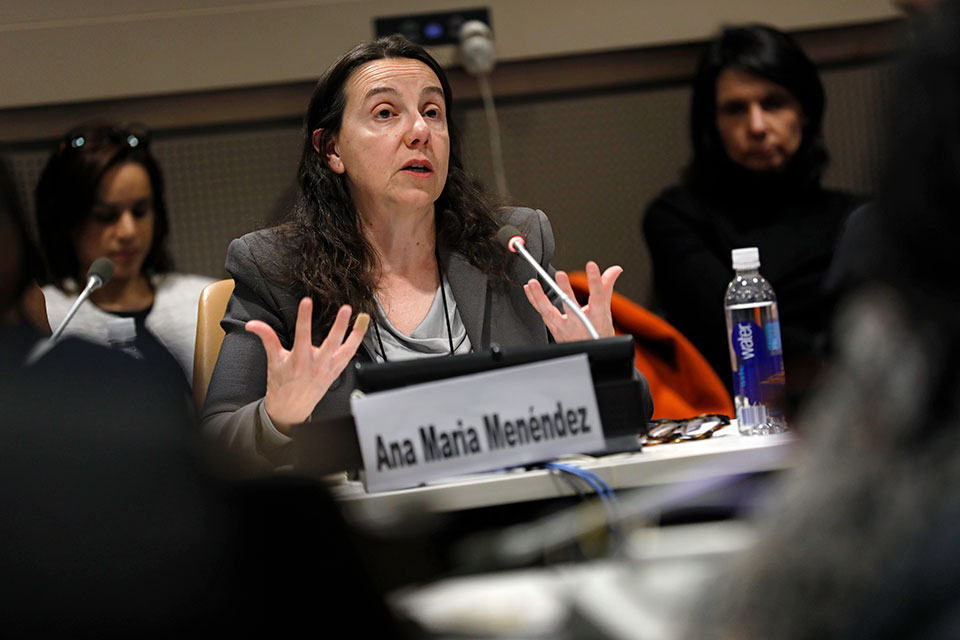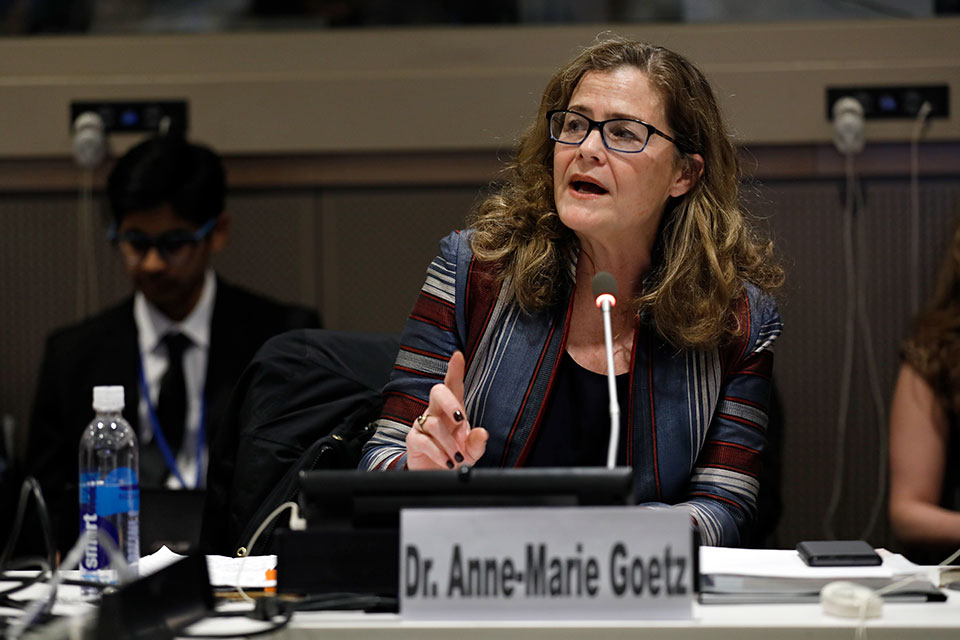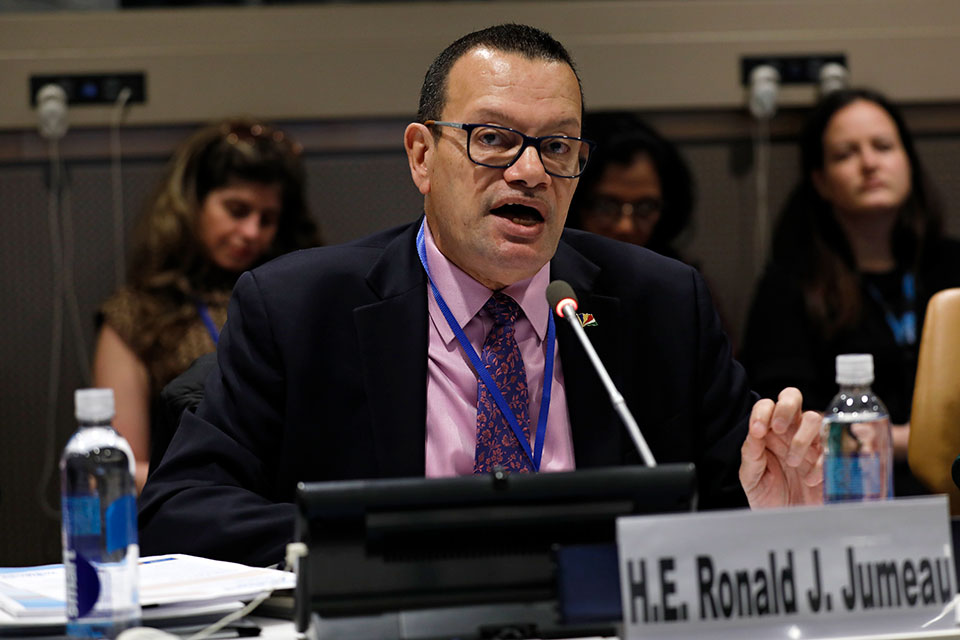After reaching gender parity in senior management, UN pushes for parity at all levels
At CSW 63, civil society, governments and UN officials stress that numbers matter, and so does cultural shift and accountability to reach gender parity across the UN.Date:

In 2018, the United Nations made significant strides in increasing women’s representation in UN leadership, with both the Senior Management Group at the headquarters and Resident Coordinators in countries reaching gender parity for the first time.
Our #CSW63 event on the "Road Ahead: Making Gender Parity a Reality" acts as a strong reminder that we need a #Planet5050 in all spaces.
— Phumzile Mlambo (@phumzileunwomen) March 18, 2019
We need a commitment to parity in:
Leadership and boardrooms,
Peacekeeping and police operations,
Politics and law-making roles. pic.twitter.com/DjZbfXBfx8
At the ongoing UN Commission on the Status of Women, a UN Women side event on 18 March, titled, “The Road Ahead: Making Gender Parity a Reality”, brought together senior UN officials, civil society and Member States to discuss how to expand the momentum for gender parity.
“The time for lip service when it comes to talking about women is long gone,” said Ambassador Ronny Jumeau, Permanent Representative of the Republic of Seychelles to the United Nations. “If you’re going to talk the talk, you better be ready to walk the talk.”
Seychelles is one of the few countries in the world with a gender-equal cabinet and as of 2019, has 45.5 per cent women in ministerial position. Ambassador Jumeau elaborated that having a Constitution that doesn’t allow discrimination on the basis of gender or race has provided a strong foundation for gender parity in Seychelles. It has also enabled women to break the stereotypes and occupy leadership positions in sectors that often see a concentration of men. “Within the cabinet, for the first time in history, the Ministry of Habitat, Land and Infrastructure…is headed by a woman. She is in charge of all housing, all infrastructure and all public domain lands, which is the bedrock of development, and of implementing the SDGs.”
UN Women Executive Director Phumzile Mlambo-Ngcuka drew attention to the need for more women in the security sector and other fields that are male-dominated: “Our dream as UN Women is that by the time we reach 2030, we can change the look and feel of the security and policing institutions by having greater diversity.”

She also stressed that while there has been a lot of progress in gender parity at the senior management level at the UN, progress is still too slow at the middle management level, and reaching parity is also about changing organizational culture. “It’s both about having adequate number of women in this institution, but also changing the culture. In some cases, it’s the culture that discourages women to become part of these organizations; and the culture that makes it difficult to be retained.” As part of its contribution towards the UN Secretary-General’s systemwide strategy for gender parity, UN Women has produced guidelines for the UN system to create an enabling environment that promotes parity.
"We need to understand how the construction of gender revolves around unequal power relationships.” - @Laxman4GE, Acting Director, @MenEngage #CSW63 pic.twitter.com/GkyspfF1Z0
— United Nations CSW (@UN_CSW) March 18, 2019
Anne-Marie Goetz, Clinical Professor at the Center for Global Affairs, and an expert on women, peace and security, explained why having more women in international public service matters, both for gender parity and for gender equality. “The marked male dominance of international public policy is not an accident, it’s a construction,” she said. “In Canada, women were fired if they got married up to 1955 if they were in international public service… it’s always been assumed that this is a male job.”
“You need diversity for creativity,” she added, pointing to the business case for gender parity.
In her recommendations about the role of civil society, Ms. Goetz highlighted the need for civil society monitoring, making sure that the UN triggers accountability processes when the numbers fall, encouraging the UN’s leadership to retain women staff and countering the resistance to having more women in field missions.
She also emphasized the need to debunk myths that say women don’t want to work for the UN in fragile states. “What needs to happen is that the work conditions have to be made appropriate,” she said.
Laxman Belbase, Acting Director of MenEngage Alliance, spoke about the importance of gender analysis in countering the backlash against gender parity efforts. “The pushback comes from this misunderstanding that gender is only about women... When you talk about gender, it’s not only about women, it’s also about the lives of men and boys who are part of the system,” he said. “We need to look at how can men play a role in dismantling the system that’s part of the problem.”

Steered by Secretary-General António Guterres, the System-wide Strategy on Gender Parity launched in September 2017, aims to reach parity across the board by 2028. The strategy provides recommended actions and targets for senior appointments, for significantly increasing the number of women peacekeepers and police, and for building an enabling environment through measures such as family-friendly policies, flexible working arrangements, as well as standards of conduct. It also suggests providing shadow reports by civil society organizations, with support from UN Women.
Ana Maria Menéndez, @UN Secretary-General’s Senior Adviser on Policy, shared 2 important gender parity deadlines:
— United Nations CSW (@UN_CSW) March 18, 2019
2021: We should have parity at senior management level of the organization
2028: We should have parity at all levels across the world.#CSW63 pic.twitter.com/SZyv6U3CCY
“There has been improvement across the board in the number of female senior leaders. It’s very possible to reach the target [for gender parity at senior management] before the year 2021,” reported Ana Maria Menéndez, Under Secretary-General of the United Nations and the Secretary-General’s Senior Adviser on Policy.
She added that more needs to be done to step up progress for women in middle management and that the UN is trying to amend some of the rules and regulations to enable more hiring and retention of women staff.
When asked about one thing that could accelerate progress in terms of reaching gender parity, Executive Director Phumzile Mlambo-Ngcuka emphasized on leadership. “When you have power, use it,” she said. “The most important thing is leadership.”
“We have to make sure that gender becomes a political agenda, and not only a development agenda,” concluded Mr. Laxman Belbase.
The event was organized by UN Women and moderated by Senior Advisor Katja Pehrman.
For more information on UN Women’s work on gender parity and efforts to improve the status of women in the UN system, please visit https://www.unwomen.org/en/how-we-work/gender-parity-in-the-united-nations and see the Enabling Environment Guidelines.